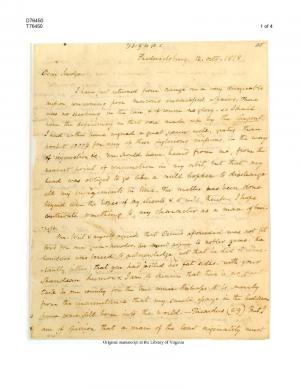Francis W. Gilmer to Dabney Carr
| Dear Judge. | Fredericksburg. 12. octr. 1818. |
I have just returned from orange on a very disagreable mission; concerning poor Macons embarassed affairs, There was no speaking in the case, & of course no glory—so I shall have the deficiency on that score made up by the l’argent. I had rather have argued a great cause well, gratis than pocket 1000$ for any of these inglorious missions, in the way of injunction &c. You should have heard from me, from the nearest point of conjunction in my orbit, but that my head was obliged to go like a mill hopper to discharge all my engagements in time. The matter has been done beyond even the hopes of my clients, & it will therefore I hope contribute something to my character as a man of business.
Mr. Wirt & myself agreed that Decius aforesaid was not fit food for our gun-powder. we must aspire to nobler game. He however was forced to acknowledge (not that he did it reluctantly either) that you had jostled his fat sides—with your Shandean humour. I am of opinion that there is no great taste in our country for the true comic. Perhaps it is merely from the circumstance that my small essays in the ludicrous have come still born into the world.—Ricardus (eg). But I am of opinion that a man of the least originality must form the public to his own taste—then they admire every thing from his pen. Ricardus—was praised by the ‘discerning few’ as one of the Dunciad hero’s would say. but I believe it was never read by 20 persons.
You should undertake something more grave and serious—if you will not write a history of parties in the US. as Tucker & I suggested—what would you say to edifying the world by a chaste, elegant, and philosophical life of Citn Thomas your Uncle? [. . .] He is in my judgement the best subject for biography after Gen: Washington which our country has afforded. This is a question worthy of consideration. It would be a great thing for a profound & eloquent writer to give an ample & rich portrait of the old Philosopher & present the proceeds [. . .] of the work to the Central College—or what perhaps would be as wise—put them in his pocket—to buy Christmas plums for his children. I fear unless the old man has a hint about this matter he will leave his papers to some quack or impostor (for you know how easily he is duped) who will disgrace his subject, himself & his country. He cannot in nature live long, & that the work may appear soon after his death it should be speedily begun—& meo judicio, you are the boy. It must possess a more [. . .] naked elegance, & unadorned grace than the life of Henry who was an orator—& sort of Gracchus, in politics.
You Winchester gentry have half forgotten me I fear—or at least cease to claim me as a son of your own climate. I seldom hear from any of you. I wish you would procure some great state criminal for me to prosecute that I may shew my zeal in the cause of your safety & glory.
My client Gibson was condemned without a hearing, no one could be prevailed on to say a word for him. I thought I had done enough before—he should be hanged—for it is the clearest & most atrocious case, I ever saw, or [. . .] heard of. Present me most affectionately to your family & my other good friends & believe me dear Judge ever your honord devoted Servant &c
Robert gibson (b. ca. 1791), alias Robert Carlton, of Baltimore, was convicted of the July 1817 murder of John Nelson Peatross “on the Williamsburg road, near the City of Richmond.” Gibson’s three trials, the first two of which were set aside, were reported in newspapers from as far away as Maine and South Carolina. Maintaining his innocence “to the last,” Gibson was executed before a large crowd in Richmond on 27 Oct. 1818 (Norfolk and Portsmouth Herald, 11 July 1817; Norfolk American Beacon and Commercial Diary, 11 July, 23 Sept. 1817; New-York Daily Advertiser, 17 July 1817; Richmond Enquirer, 21 Apr. 1818; Alexandria Gazette & Daily Advertiser, 4 May, 3 Oct. 1818; Washington, D.C., Gazette, 31 Oct. 1818).
